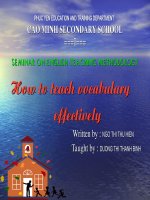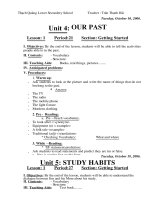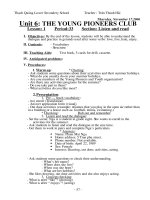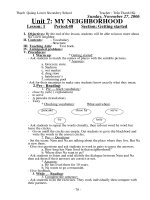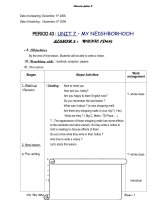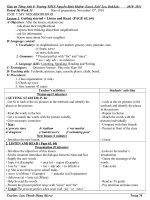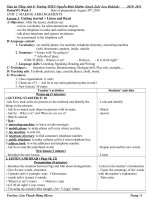TIENG ANH 8 BÀI 5
Bạn đang xem bản rút gọn của tài liệu. Xem và tải ngay bản đầy đủ của tài liệu tại đây (277.89 KB, 59 trang )
Th¹ch Qu¶ng Lower Secondery School Teacher : TrÇn Thanh H¶i
Tuesday, October 10, 2006.
Unit 4:
OUr past
Lesson: 1 Period:21 Section: Getting Started
I. Objectives:
By the end of the lesson, students will be able to tell the acrtivities
people able to in the past.
II. Contents:
- Vocabulary
- Structure:
III. Teaching Aids:
Books, real things, pictures… … .
IV. Anticipated problems:
V. Proceduces:
1.
Warm up
:
-
Ask students to look at the picture and write the name of things that do not
boelong to the past.
•
Answer:
-
The TV
-
The radio
-
The mobile phone
-
The light fixture
-
Mordern clothing
2.
Pre - Reading:
a. Pre – Teach vocabulary.
-
To look after < synonym>
-
Equipment (n) < example>
-
A folk tale <example>
-
Traditional (adj) < translation>
* Checking Vocabulary: What and where
3. While – Reading:
* T/F statement prediction:
-
Ask students to read statements and predict they are tru or false.
a. Nga is used to live on the farm.
b. Nga’s grandma didn’t go to school.
c. She has an easy and happy life when she was young.
d. There wasn’t any modern equipment at her time.
e. “The lost shoe” is a short story.
Tuesday, October 18, 2006.
Unit 5: study habits
Lesson: 1 Period:27 Section: Getting Started
I. Objectives: By the end of the lesson, students will be able to understand the
dialogue between Jim and his Mom about his study.
II. Contents: - Vocabulary
Th¹ch Qu¶ng Lower Secondery School Teacher : TrÇn Thanh H¶i
Tuesday, October 10, 2006.
Unit 4:
OUr past
Lesson: 1 Period:21 Section: Getting Started
I. Objectives:
By the end of the lesson, students will be able to tell the acrtivities
people able to in the past.
II. Contents:
- Vocabulary
- Structure:
III. Teaching Aids:
Books, real things, pictures… … .
IV. Anticipated problems:
V. Proceduces:
1.
Warm up
:
-
Ask students to look at the picture and write the name of things that do not
boelong to the past.
•
Answer:
-
The TV
-
The radio
-
The mobile phone
-
The light fixture
-
Mordern clothing
2.
Pre - Reading:
a. Pre – Teach vocabulary.
-
To look after < synonym>
-
Equipment (n) < example>
-
A folk tale <example>
-
Traditional (adj) < translation>
* Checking Vocabulary: What and where
3. While – Reading:
* T/F statement prediction:
-
Ask students to read statements and predict they are tru or false.
a. Nga is used to live on the farm.
b. Nga’s grandma didn’t go to school.
c. She has an easy and happy life when she was young.
d. There wasn’t any modern equipment at her time.
e. “The lost shoe” is a short story.
- Structure:
III. Teaching Aids: Text book…….
IV. Anticipated problems:
V. Proceduces:
1. Warm up: * Net work:
- Ask students to write as many subjects as they canon the blackboard.
Chemistry Physics Math
Th¹ch Qu¶ng Lower Secondery School Teacher : TrÇn Thanh H¶i
Tuesday, October 10, 2006.
Unit 4:
OUr past
Lesson: 1 Period:21 Section: Getting Started
I. Objectives:
By the end of the lesson, students will be able to tell the acrtivities
people able to in the past.
II. Contents:
- Vocabulary
- Structure:
III. Teaching Aids:
Books, real things, pictures… … .
IV. Anticipated problems:
V. Proceduces:
1.
Warm up
:
-
Ask students to look at the picture and write the name of things that do not
boelong to the past.
•
Answer:
-
The TV
-
The radio
-
The mobile phone
-
The light fixture
-
Mordern clothing
2.
Pre - Reading:
a. Pre – Teach vocabulary.
-
To look after < synonym>
-
Equipment (n) < example>
-
A folk tale <example>
-
Traditional (adj) < translation>
* Checking Vocabulary: What and where
3. While – Reading:
* T/F statement prediction:
-
Ask students to read statements and predict they are tru or false.
a. Nga is used to live on the farm.
b. Nga’s grandma didn’t go to school.
c. She has an easy and happy life when she was young.
d. There wasn’t any modern equipment at her time.
e. “The lost shoe” is a short story.
Subjects
Geography
Literature History
2. Pre - Reading: * Chatting. Ask students somr questions:
- What subject are you good at?
- What subject are you bad at?
- What subject do you like best? Why?
- How often do you have math?
Th¹ch Qu¶ng Lower Secondery School Teacher : TrÇn Thanh H¶i
Tuesday, October 10, 2006.
Unit 4:
OUr past
Lesson: 1 Period:21 Section: Getting Started
I. Objectives:
By the end of the lesson, students will be able to tell the acrtivities
people able to in the past.
II. Contents:
- Vocabulary
- Structure:
III. Teaching Aids:
Books, real things, pictures… … .
IV. Anticipated problems:
V. Proceduces:
1.
Warm up
:
-
Ask students to look at the picture and write the name of things that do not
boelong to the past.
•
Answer:
-
The TV
-
The radio
-
The mobile phone
-
The light fixture
-
Mordern clothing
2.
Pre - Reading:
a. Pre – Teach vocabulary.
-
To look after < synonym>
-
Equipment (n) < example>
-
A folk tale <example>
-
Traditional (adj) < translation>
* Checking Vocabulary: What and where
3. While – Reading:
* T/F statement prediction:
-
Ask students to read statements and predict they are tru or false.
a. Nga is used to live on the farm.
b. Nga’s grandma didn’t go to school.
c. She has an easy and happy life when she was young.
d. There wasn’t any modern equipment at her time.
e. “The lost shoe” is a short story.
- How often do you have literature?
- How often do you have English?
1. Pre – vocabulary :
- A report card (realia)
- Pronunciation (mime)
- To improve (situation)
- To be proud of (translation)
- To try one’s best (translation)
* Checking: Rub out and remember:
Th¹ch Qu¶ng Lower Secondery School Teacher : TrÇn Thanh H¶i
Tuesday, October 10, 2006.
Unit 4:
OUr past
Lesson: 1 Period:21 Section: Getting Started
I. Objectives:
By the end of the lesson, students will be able to tell the acrtivities
people able to in the past.
II. Contents:
- Vocabulary
- Structure:
III. Teaching Aids:
Books, real things, pictures… … .
IV. Anticipated problems:
V. Proceduces:
1.
Warm up
:
-
Ask students to look at the picture and write the name of things that do not
boelong to the past.
•
Answer:
-
The TV
-
The radio
-
The mobile phone
-
The light fixture
-
Mordern clothing
2.
Pre - Reading:
a. Pre – Teach vocabulary.
-
To look after < synonym>
-
Equipment (n) < example>
-
A folk tale <example>
-
Traditional (adj) < translation>
* Checking Vocabulary: What and where
3. While – Reading:
* T/F statement prediction:
-
Ask students to read statements and predict they are tru or false.
a. Nga is used to live on the farm.
b. Nga’s grandma didn’t go to school.
c. She has an easy and happy life when she was young.
d. There wasn’t any modern equipment at her time.
e. “The lost shoe” is a short story.
2. T /F statement prediction :
- Ask students to read the statements and predick they are true or false.
- Ask them to share with their partners.
* T / F statements:
a. Tim was out when his mother called him.
b. Tim’s mother met his teacher at school.
c. Tim’s report is poor.
d. Tim needs to improve his Spanish grammar.
e. Tim promised to try his best in learning Spanish.
Th¹ch Qu¶ng Lower Secondery School Teacher : TrÇn Thanh H¶i
Tuesday, October 10, 2006.
Unit 4:
OUr past
Lesson: 1 Period:21 Section: Getting Started
I. Objectives:
By the end of the lesson, students will be able to tell the acrtivities
people able to in the past.
II. Contents:
- Vocabulary
- Structure:
III. Teaching Aids:
Books, real things, pictures… … .
IV. Anticipated problems:
V. Proceduces:
1.
Warm up
:
-
Ask students to look at the picture and write the name of things that do not
boelong to the past.
•
Answer:
-
The TV
-
The radio
-
The mobile phone
-
The light fixture
-
Mordern clothing
2.
Pre - Reading:
a. Pre – Teach vocabulary.
-
To look after < synonym>
-
Equipment (n) < example>
-
A folk tale <example>
-
Traditional (adj) < translation>
* Checking Vocabulary: What and where
3. While – Reading:
* T/F statement prediction:
-
Ask students to read statements and predict they are tru or false.
a. Nga is used to live on the farm.
b. Nga’s grandma didn’t go to school.
c. She has an easy and happy life when she was young.
d. There wasn’t any modern equipment at her time.
e. “The lost shoe” is a short story.
- Givefeedback.
3. While – Reading:
1. Reading :
- Get students to read the dialogue and chech their prediction.
- Give feedback.
Correct Guess
a.
b.
c.
F
T
F
Th¹ch Qu¶ng Lower Secondery School Teacher : TrÇn Thanh H¶i
Tuesday, October 10, 2006.
Unit 4:
OUr past
Lesson: 1 Period:21 Section: Getting Started
I. Objectives:
By the end of the lesson, students will be able to tell the acrtivities
people able to in the past.
II. Contents:
- Vocabulary
- Structure:
III. Teaching Aids:
Books, real things, pictures… … .
IV. Anticipated problems:
V. Proceduces:
1.
Warm up
:
-
Ask students to look at the picture and write the name of things that do not
boelong to the past.
•
Answer:
-
The TV
-
The radio
-
The mobile phone
-
The light fixture
-
Mordern clothing
2.
Pre - Reading:
a. Pre – Teach vocabulary.
-
To look after < synonym>
-
Equipment (n) < example>
-
A folk tale <example>
-
Traditional (adj) < translation>
* Checking Vocabulary: What and where
3. While – Reading:
* T/F statement prediction:
-
Ask students to read statements and predict they are tru or false.
a. Nga is used to live on the farm.
b. Nga’s grandma didn’t go to school.
c. She has an easy and happy life when she was young.
d. There wasn’t any modern equipment at her time.
e. “The lost shoe” is a short story.
d.
e.
F
T
- Ask students to correct false statements.
* Answers:
a. F – Tim was in the livingroom/ at home.
b. F – His report is excellent.
c. F – He needs to improve his Spanish pronunciation.
2. Comprehension questions:
Th¹ch Qu¶ng Lower Secondery School Teacher : TrÇn Thanh H¶i
Tuesday, October 10, 2006.
Unit 4:
OUr past
Lesson: 1 Period:21 Section: Getting Started
I. Objectives:
By the end of the lesson, students will be able to tell the acrtivities
people able to in the past.
II. Contents:
- Vocabulary
- Structure:
III. Teaching Aids:
Books, real things, pictures… … .
IV. Anticipated problems:
V. Proceduces:
1.
Warm up
:
-
Ask students to look at the picture and write the name of things that do not
boelong to the past.
•
Answer:
-
The TV
-
The radio
-
The mobile phone
-
The light fixture
-
Mordern clothing
2.
Pre - Reading:
a. Pre – Teach vocabulary.
-
To look after < synonym>
-
Equipment (n) < example>
-
A folk tale <example>
-
Traditional (adj) < translation>
* Checking Vocabulary: What and where
3. While – Reading:
* T/F statement prediction:
-
Ask students to read statements and predict they are tru or false.
a. Nga is used to live on the farm.
b. Nga’s grandma didn’t go to school.
c. She has an easy and happy life when she was young.
d. There wasn’t any modern equipment at her time.
e. “The lost shoe” is a short story.
- Ask students to work in pairs, answering the question on page 47 .
* Answer:
a. She is Tim’s teacher.
b. She gave Tim’s mother his report card.
c. He worked really hard.
d. She said Tim shoud work harder on his Spanish pronunciation.
e. She gave him a directory.
4. Post – reading:
- Ask students to work in open pairs the closed pairs.
Th¹ch Qu¶ng Lower Secondery School Teacher : TrÇn Thanh H¶i
Tuesday, October 10, 2006.
Unit 4:
OUr past
Lesson: 1 Period:21 Section: Getting Started
I. Objectives:
By the end of the lesson, students will be able to tell the acrtivities
people able to in the past.
II. Contents:
- Vocabulary
- Structure:
III. Teaching Aids:
Books, real things, pictures… … .
IV. Anticipated problems:
V. Proceduces:
1.
Warm up
:
-
Ask students to look at the picture and write the name of things that do not
boelong to the past.
•
Answer:
-
The TV
-
The radio
-
The mobile phone
-
The light fixture
-
Mordern clothing
2.
Pre - Reading:
a. Pre – Teach vocabulary.
-
To look after < synonym>
-
Equipment (n) < example>
-
A folk tale <example>
-
Traditional (adj) < translation>
* Checking Vocabulary: What and where
3. While – Reading:
* T/F statement prediction:
-
Ask students to read statements and predict they are tru or false.
a. Nga is used to live on the farm.
b. Nga’s grandma didn’t go to school.
c. She has an easy and happy life when she was young.
d. There wasn’t any modern equipment at her time.
e. “The lost shoe” is a short story.
* Servey:
- Ask students to work in group.
- Ask the to stand up and ask each other the question: “What subject do you
need to impove?”. They have to write the names and the subjects that their
friends answer.
Eg:
Nam What subject
Mai Literature
Th¹ch Qu¶ng Lower Secondery School Teacher : TrÇn Thanh H¶i
Tuesday, October 10, 2006.
Unit 4:
OUr past
Lesson: 1 Period:21 Section: Getting Started
I. Objectives:
By the end of the lesson, students will be able to tell the acrtivities
people able to in the past.
II. Contents:
- Vocabulary
- Structure:
III. Teaching Aids:
Books, real things, pictures… … .
IV. Anticipated problems:
V. Proceduces:
1.
Warm up
:
-
Ask students to look at the picture and write the name of things that do not
boelong to the past.
•
Answer:
-
The TV
-
The radio
-
The mobile phone
-
The light fixture
-
Mordern clothing
2.
Pre - Reading:
a. Pre – Teach vocabulary.
-
To look after < synonym>
-
Equipment (n) < example>
-
A folk tale <example>
-
Traditional (adj) < translation>
* Checking Vocabulary: What and where
3. While – Reading:
* T/F statement prediction:
-
Ask students to read statements and predict they are tru or false.
a. Nga is used to live on the farm.
b. Nga’s grandma didn’t go to school.
c. She has an easy and happy life when she was young.
d. There wasn’t any modern equipment at her time.
e. “The lost shoe” is a short story.
- Give feedback.
- Ask students who need to improve the same subject work in groups and
discuss how to improve.
5. Homework:
- Write the way how to improve the subject that you are not good at.
Th¹ch Qu¶ng Lower Secondery School Teacher : TrÇn Thanh H¶i
Tuesday, October 10, 2006.
Unit 4:
OUr past
Lesson: 1 Period:21 Section: Getting Started
I. Objectives:
By the end of the lesson, students will be able to tell the acrtivities
people able to in the past.
II. Contents:
- Vocabulary
- Structure:
III. Teaching Aids:
Books, real things, pictures… … .
IV. Anticipated problems:
V. Proceduces:
1.
Warm up
:
-
Ask students to look at the picture and write the name of things that do not
boelong to the past.
•
Answer:
-
The TV
-
The radio
-
The mobile phone
-
The light fixture
-
Mordern clothing
2.
Pre - Reading:
a. Pre – Teach vocabulary.
-
To look after < synonym>
-
Equipment (n) < example>
-
A folk tale <example>
-
Traditional (adj) < translation>
* Checking Vocabulary: What and where
3. While – Reading:
* T/F statement prediction:
-
Ask students to read statements and predict they are tru or false.
a. Nga is used to live on the farm.
b. Nga’s grandma didn’t go to school.
c. She has an easy and happy life when she was young.
d. There wasn’t any modern equipment at her time.
e. “The lost shoe” is a short story.
Unit 5: study habits
Lesson: 2 Period:28 Section: Speak - Listen
I. Objectives: By the end of the lesson, students will be able to talk about their
study habits and to listen for specific information to fill in a report card.
II. Contents: - Vocabulary
- Structure:
Th¹ch Qu¶ng Lower Secondery School Teacher : TrÇn Thanh H¶i
Tuesday, October 10, 2006.
Unit 4:
OUr past
Lesson: 1 Period:21 Section: Getting Started
I. Objectives:
By the end of the lesson, students will be able to tell the acrtivities
people able to in the past.
II. Contents:
- Vocabulary
- Structure:
III. Teaching Aids:
Books, real things, pictures… … .
IV. Anticipated problems:
V. Proceduces:
1.
Warm up
:
-
Ask students to look at the picture and write the name of things that do not
boelong to the past.
•
Answer:
-
The TV
-
The radio
-
The mobile phone
-
The light fixture
-
Mordern clothing
2.
Pre - Reading:
a. Pre – Teach vocabulary.
-
To look after < synonym>
-
Equipment (n) < example>
-
A folk tale <example>
-
Traditional (adj) < translation>
* Checking Vocabulary: What and where
3. While – Reading:
* T/F statement prediction:
-
Ask students to read statements and predict they are tru or false.
a. Nga is used to live on the farm.
b. Nga’s grandma didn’t go to school.
c. She has an easy and happy life when she was young.
d. There wasn’t any modern equipment at her time.
e. “The lost shoe” is a short story.
III. Teaching Aids: Text book, Poster.
IV. Anticipated problems:
V. Proceduces:
1. Warm up: * Brainstorming:
- Ask students towrite their ideas on the blackboard.
Speak English Listen to the
Th¹ch Qu¶ng Lower Secondery School Teacher : TrÇn Thanh H¶i
Tuesday, October 10, 2006.
Unit 4:
OUr past
Lesson: 1 Period:21 Section: Getting Started
I. Objectives:
By the end of the lesson, students will be able to tell the acrtivities
people able to in the past.
II. Contents:
- Vocabulary
- Structure:
III. Teaching Aids:
Books, real things, pictures… … .
IV. Anticipated problems:
V. Proceduces:
1.
Warm up
:
-
Ask students to look at the picture and write the name of things that do not
boelong to the past.
•
Answer:
-
The TV
-
The radio
-
The mobile phone
-
The light fixture
-
Mordern clothing
2.
Pre - Reading:
a. Pre – Teach vocabulary.
-
To look after < synonym>
-
Equipment (n) < example>
-
A folk tale <example>
-
Traditional (adj) < translation>
* Checking Vocabulary: What and where
3. While – Reading:
* T/F statement prediction:
-
Ask students to read statements and predict they are tru or false.
a. Nga is used to live on the farm.
b. Nga’s grandma didn’t go to school.
c. She has an easy and happy life when she was young.
d. There wasn’t any modern equipment at her time.
e. “The lost shoe” is a short story.
to friend in class English radio program
How to improve Read English
Your English Newspapers/
Magazines
Watch English Read English
TV Do grammar Story
exercese
Th¹ch Qu¶ng Lower Secondery School Teacher : TrÇn Thanh H¶i
Tuesday, October 10, 2006.
Unit 4:
OUr past
Lesson: 1 Period:21 Section: Getting Started
I. Objectives:
By the end of the lesson, students will be able to tell the acrtivities
people able to in the past.
II. Contents:
- Vocabulary
- Structure:
III. Teaching Aids:
Books, real things, pictures… … .
IV. Anticipated problems:
V. Proceduces:
1.
Warm up
:
-
Ask students to look at the picture and write the name of things that do not
boelong to the past.
•
Answer:
-
The TV
-
The radio
-
The mobile phone
-
The light fixture
-
Mordern clothing
2.
Pre - Reading:
a. Pre – Teach vocabulary.
-
To look after < synonym>
-
Equipment (n) < example>
-
A folk tale <example>
-
Traditional (adj) < translation>
* Checking Vocabulary: What and where
3. While – Reading:
* T/F statement prediction:
-
Ask students to read statements and predict they are tru or false.
a. Nga is used to live on the farm.
b. Nga’s grandma didn’t go to school.
c. She has an easy and happy life when she was young.
d. There wasn’t any modern equipment at her time.
e. “The lost shoe” is a short story.
2. Pre – Listening:
a. Pre – teach vocabulary .
- Behavier (n) (translation)
- A participant (n) (Explanation )
- Satisfactory = Unsatisfactory
- Cooperation (n) (translation)
- Attendance (n) (translation)
- To appreciate (translation)
b. Prediction .
Th¹ch Qu¶ng Lower Secondery School Teacher : TrÇn Thanh H¶i
Tuesday, October 10, 2006.
Unit 4:
OUr past
Lesson: 1 Period:21 Section: Getting Started
I. Objectives:
By the end of the lesson, students will be able to tell the acrtivities
people able to in the past.
II. Contents:
- Vocabulary
- Structure:
III. Teaching Aids:
Books, real things, pictures… … .
IV. Anticipated problems:
V. Proceduces:
1.
Warm up
:
-
Ask students to look at the picture and write the name of things that do not
boelong to the past.
•
Answer:
-
The TV
-
The radio
-
The mobile phone
-
The light fixture
-
Mordern clothing
2.
Pre - Reading:
a. Pre – Teach vocabulary.
-
To look after < synonym>
-
Equipment (n) < example>
-
A folk tale <example>
-
Traditional (adj) < translation>
* Checking Vocabulary: What and where
3. While – Reading:
* T/F statement prediction:
-
Ask students to read statements and predict they are tru or false.
a. Nga is used to live on the farm.
b. Nga’s grandma didn’t go to school.
c. She has an easy and happy life when she was young.
d. There wasn’t any modern equipment at her time.
e. “The lost shoe” is a short story.
- Ask students to look at Nga’s report and predict the missing information and then
compare with their partners.
a. Day present (1) e. Listening (4)
b. Day absent (2) d. Reading (6
c. Behavior – participant (3) e. Writing (7)
- Give feedback
3. While – Listening:
1. Listen .
- Get students to listen to the tape and their prediction.
Th¹ch Qu¶ng Lower Secondery School Teacher : TrÇn Thanh H¶i
Tuesday, October 10, 2006.
Unit 4:
OUr past
Lesson: 1 Period:21 Section: Getting Started
I. Objectives:
By the end of the lesson, students will be able to tell the acrtivities
people able to in the past.
II. Contents:
- Vocabulary
- Structure:
III. Teaching Aids:
Books, real things, pictures… … .
IV. Anticipated problems:
V. Proceduces:
1.
Warm up
:
-
Ask students to look at the picture and write the name of things that do not
boelong to the past.
•
Answer:
-
The TV
-
The radio
-
The mobile phone
-
The light fixture
-
Mordern clothing
2.
Pre - Reading:
a. Pre – Teach vocabulary.
-
To look after < synonym>
-
Equipment (n) < example>
-
A folk tale <example>
-
Traditional (adj) < translation>
* Checking Vocabulary: What and where
3. While – Reading:
* T/F statement prediction:
-
Ask students to read statements and predict they are tru or false.
a. Nga is used to live on the farm.
b. Nga’s grandma didn’t go to school.
c. She has an easy and happy life when she was young.
d. There wasn’t any modern equipment at her time.
e. “The lost shoe” is a short story.
(1) 87 days present (5) Listening: Comprehension
(2) 5 days absent (6) Speaking: A
(3) Participation: Spanish pronuciation(7) Reading: A
(4) Writing: B
2. Comprehension questions .
- Ask students to answer some questions about Nga’s report card.
Questions and answers:
a. Who are Nga’s parents?
- They are Mr. Lam and Mr. Linh.
Th¹ch Qu¶ng Lower Secondery School Teacher : TrÇn Thanh H¶i
Tuesday, October 10, 2006.
Unit 4:
OUr past
Lesson: 1 Period:21 Section: Getting Started
I. Objectives:
By the end of the lesson, students will be able to tell the acrtivities
people able to in the past.
II. Contents:
- Vocabulary
- Structure:
III. Teaching Aids:
Books, real things, pictures… … .
IV. Anticipated problems:
V. Proceduces:
1.
Warm up
:
-
Ask students to look at the picture and write the name of things that do not
boelong to the past.
•
Answer:
-
The TV
-
The radio
-
The mobile phone
-
The light fixture
-
Mordern clothing
2.
Pre - Reading:
a. Pre – Teach vocabulary.
-
To look after < synonym>
-
Equipment (n) < example>
-
A folk tale <example>
-
Traditional (adj) < translation>
* Checking Vocabulary: What and where
3. While – Reading:
* T/F statement prediction:
-
Ask students to read statements and predict they are tru or false.
a. Nga is used to live on the farm.
b. Nga’s grandma didn’t go to school.
c. She has an easy and happy life when she was young.
d. There wasn’t any modern equipment at her time.
e. “The lost shoe” is a short story.
b. What’s Nga’s teacher’s name? – Miss Lien
c. What subject was reported? For what term? – English.
d. What are the comments?
- Speaking English quite well. However she does need to improve her listening skill.
e. What does S stand for? What’s about F,U,A,B,C,D.
- Ask students to work on their own to answer the questions.
- Give feedback.
4. Post – Listening:
Questions You Your partner
Th¹ch Qu¶ng Lower Secondery School Teacher : TrÇn Thanh H¶i
Tuesday, October 10, 2006.
Unit 4:
OUr past
Lesson: 1 Period:21 Section: Getting Started
I. Objectives:
By the end of the lesson, students will be able to tell the acrtivities
people able to in the past.
II. Contents:
- Vocabulary
- Structure:
III. Teaching Aids:
Books, real things, pictures… … .
IV. Anticipated problems:
V. Proceduces:
1.
Warm up
:
-
Ask students to look at the picture and write the name of things that do not
boelong to the past.
•
Answer:
-
The TV
-
The radio
-
The mobile phone
-
The light fixture
-
Mordern clothing
2.
Pre - Reading:
a. Pre – Teach vocabulary.
-
To look after < synonym>
-
Equipment (n) < example>
-
A folk tale <example>
-
Traditional (adj) < translation>
* Checking Vocabulary: What and where
3. While – Reading:
* T/F statement prediction:
-
Ask students to read statements and predict they are tru or false.
a. Nga is used to live on the farm.
b. Nga’s grandma didn’t go to school.
c. She has an easy and happy life when she was young.
d. There wasn’t any modern equipment at her time.
e. “The lost shoe” is a short story.
1. When do you do your homework?
2. Who help you with your homework?
3. How much time do you spend on:
Math? English? History? Literature?
4. Which subject do you need to improve?
5. What do you do to improve your
English?
- Ask students to work in pairs, asking their partners questions and taking notes of
the answers.
Th¹ch Qu¶ng Lower Secondery School Teacher : TrÇn Thanh H¶i
Tuesday, October 10, 2006.
Unit 4:
OUr past
Lesson: 1 Period:21 Section: Getting Started
I. Objectives:
By the end of the lesson, students will be able to tell the acrtivities
people able to in the past.
II. Contents:
- Vocabulary
- Structure:
III. Teaching Aids:
Books, real things, pictures… … .
IV. Anticipated problems:
V. Proceduces:
1.
Warm up
:
-
Ask students to look at the picture and write the name of things that do not
boelong to the past.
•
Answer:
-
The TV
-
The radio
-
The mobile phone
-
The light fixture
-
Mordern clothing
2.
Pre - Reading:
a. Pre – Teach vocabulary.
-
To look after < synonym>
-
Equipment (n) < example>
-
A folk tale <example>
-
Traditional (adj) < translation>
* Checking Vocabulary: What and where
3. While – Reading:
* T/F statement prediction:
-
Ask students to read statements and predict they are tru or false.
a. Nga is used to live on the farm.
b. Nga’s grandma didn’t go to school.
c. She has an easy and happy life when she was young.
d. There wasn’t any modern equipment at her time.
e. “The lost shoe” is a short story.
- Ask students to work in groups of 4 or 5 to report what they have known about
their partners’ study. Students can use this structure to talk.
- Nam said he did his homework after dinner.
- Hoa said his father helped her with her homework.
- Lan said she spent 2 hours studying math.
- Ba said he needed to improve Literature.
- Mai said she should do more grammar exercises.
- Write something about yur partners’ study habits.
5. Homework:
Th¹ch Qu¶ng Lower Secondery School Teacher : TrÇn Thanh H¶i
Tuesday, October 10, 2006.
Unit 4:
OUr past
Lesson: 1 Period:21 Section: Getting Started
I. Objectives:
By the end of the lesson, students will be able to tell the acrtivities
people able to in the past.
II. Contents:
- Vocabulary
- Structure:
III. Teaching Aids:
Books, real things, pictures… … .
IV. Anticipated problems:
V. Proceduces:
1.
Warm up
:
-
Ask students to look at the picture and write the name of things that do not
boelong to the past.
•
Answer:
-
The TV
-
The radio
-
The mobile phone
-
The light fixture
-
Mordern clothing
2.
Pre - Reading:
a. Pre – Teach vocabulary.
-
To look after < synonym>
-
Equipment (n) < example>
-
A folk tale <example>
-
Traditional (adj) < translation>
* Checking Vocabulary: What and where
3. While – Reading:
* T/F statement prediction:
-
Ask students to read statements and predict they are tru or false.
a. Nga is used to live on the farm.
b. Nga’s grandma didn’t go to school.
c. She has an easy and happy life when she was young.
d. There wasn’t any modern equipment at her time.
e. “The lost shoe” is a short story.
Eg: “Hoa is my best friend. She works very hard and always get good grades.
She usually does her homework after school...”
Unit 5: study habits
Th¹ch Qu¶ng Lower Secondery School Teacher : TrÇn Thanh H¶i
Tuesday, October 10, 2006.
Unit 4:
OUr past
Lesson: 1 Period:21 Section: Getting Started
I. Objectives:
By the end of the lesson, students will be able to tell the acrtivities
people able to in the past.
II. Contents:
- Vocabulary
- Structure:
III. Teaching Aids:
Books, real things, pictures… … .
IV. Anticipated problems:
V. Proceduces:
1.
Warm up
:
-
Ask students to look at the picture and write the name of things that do not
boelong to the past.
•
Answer:
-
The TV
-
The radio
-
The mobile phone
-
The light fixture
-
Mordern clothing
2.
Pre - Reading:
a. Pre – Teach vocabulary.
-
To look after < synonym>
-
Equipment (n) < example>
-
A folk tale <example>
-
Traditional (adj) < translation>
* Checking Vocabulary: What and where
3. While – Reading:
* T/F statement prediction:
-
Ask students to read statements and predict they are tru or false.
a. Nga is used to live on the farm.
b. Nga’s grandma didn’t go to school.
c. She has an easy and happy life when she was young.
d. There wasn’t any modern equipment at her time.
e. “The lost shoe” is a short story.
Lesson: 3 Period:29 Section: Read
I. Objectives: By the end of the lesson, students will be able to undrestand the text
and get specific information.
II. Contents: - Vocabulary
- Structure:
III. Teaching Aids: Text book.
IV. Anticipated problems:
V. Proceduces:
Th¹ch Qu¶ng Lower Secondery School Teacher : TrÇn Thanh H¶i
Tuesday, October 10, 2006.
Unit 4:
OUr past
Lesson: 1 Period:21 Section: Getting Started
I. Objectives:
By the end of the lesson, students will be able to tell the acrtivities
people able to in the past.
II. Contents:
- Vocabulary
- Structure:
III. Teaching Aids:
Books, real things, pictures… … .
IV. Anticipated problems:
V. Proceduces:
1.
Warm up
:
-
Ask students to look at the picture and write the name of things that do not
boelong to the past.
•
Answer:
-
The TV
-
The radio
-
The mobile phone
-
The light fixture
-
Mordern clothing
2.
Pre - Reading:
a. Pre – Teach vocabulary.
-
To look after < synonym>
-
Equipment (n) < example>
-
A folk tale <example>
-
Traditional (adj) < translation>
* Checking Vocabulary: What and where
3. While – Reading:
* T/F statement prediction:
-
Ask students to read statements and predict they are tru or false.
a. Nga is used to live on the farm.
b. Nga’s grandma didn’t go to school.
c. She has an easy and happy life when she was young.
d. There wasn’t any modern equipment at her time.
e. “The lost shoe” is a short story.
1. Warm up: * Chatting:
- Ask students some questions about their English learning.
- Do you like learning English?
- How many new words do you try to learn a day?
- What do you do when you read a new word?
- How do you learn/ remember new words?
2. Pre – reading.
a. Pre – teach vocabulary .
- Mother tongue (example)
Th¹ch Qu¶ng Lower Secondery School Teacher : TrÇn Thanh H¶i
Tuesday, October 10, 2006.
Unit 4:
OUr past
Lesson: 1 Period:21 Section: Getting Started
I. Objectives:
By the end of the lesson, students will be able to tell the acrtivities
people able to in the past.
II. Contents:
- Vocabulary
- Structure:
III. Teaching Aids:
Books, real things, pictures… … .
IV. Anticipated problems:
V. Proceduces:
1.
Warm up
:
-
Ask students to look at the picture and write the name of things that do not
boelong to the past.
•
Answer:
-
The TV
-
The radio
-
The mobile phone
-
The light fixture
-
Mordern clothing
2.
Pre - Reading:
a. Pre – Teach vocabulary.
-
To look after < synonym>
-
Equipment (n) < example>
-
A folk tale <example>
-
Traditional (adj) < translation>
* Checking Vocabulary: What and where
3. While – Reading:
* T/F statement prediction:
-
Ask students to read statements and predict they are tru or false.
a. Nga is used to live on the farm.
b. Nga’s grandma didn’t go to school.
c. She has an easy and happy life when she was young.
d. There wasn’t any modern equipment at her time.
e. “The lost shoe” is a short story.
- To underline (example)
- To highlight (example)
- To come across (synonym)
- To stick (mime)
• Checking.
- By playing the game “slap the board.”
b. Brainstorming :
- Ask students to work in pairs to make a list of the ways how a language learner
can learn new words.
Th¹ch Qu¶ng Lower Secondery School Teacher : TrÇn Thanh H¶i
Tuesday, October 10, 2006.
Unit 4:
OUr past
Lesson: 1 Period:21 Section: Getting Started
I. Objectives:
By the end of the lesson, students will be able to tell the acrtivities
people able to in the past.
II. Contents:
- Vocabulary
- Structure:
III. Teaching Aids:
Books, real things, pictures… … .
IV. Anticipated problems:
V. Proceduces:
1.
Warm up
:
-
Ask students to look at the picture and write the name of things that do not
boelong to the past.
•
Answer:
-
The TV
-
The radio
-
The mobile phone
-
The light fixture
-
Mordern clothing
2.
Pre - Reading:
a. Pre – Teach vocabulary.
-
To look after < synonym>
-
Equipment (n) < example>
-
A folk tale <example>
-
Traditional (adj) < translation>
* Checking Vocabulary: What and where
3. While – Reading:
* T/F statement prediction:
-
Ask students to read statements and predict they are tru or false.
a. Nga is used to live on the farm.
b. Nga’s grandma didn’t go to school.
c. She has an easy and happy life when she was young.
d. There wasn’t any modern equipment at her time.
e. “The lost shoe” is a short story.
Learn by heart Translate it in to mother tongue
Learn through Ways language learners
example Learn new words
sentences
Write each word on one piece
Write it on a small piece of paper and put it in to the
Of paper and stick everywhere pocket to learn whenever
Th¹ch Qu¶ng Lower Secondery School Teacher : TrÇn Thanh H¶i
Tuesday, October 10, 2006.
Unit 4:
OUr past
Lesson: 1 Period:21 Section: Getting Started
I. Objectives:
By the end of the lesson, students will be able to tell the acrtivities
people able to in the past.
II. Contents:
- Vocabulary
- Structure:
III. Teaching Aids:
Books, real things, pictures… … .
IV. Anticipated problems:
V. Proceduces:
1.
Warm up
:
-
Ask students to look at the picture and write the name of things that do not
boelong to the past.
•
Answer:
-
The TV
-
The radio
-
The mobile phone
-
The light fixture
-
Mordern clothing
2.
Pre - Reading:
a. Pre – Teach vocabulary.
-
To look after < synonym>
-
Equipment (n) < example>
-
A folk tale <example>
-
Traditional (adj) < translation>
* Checking Vocabulary: What and where
3. While – Reading:
* T/F statement prediction:
-
Ask students to read statements and predict they are tru or false.
a. Nga is used to live on the farm.
b. Nga’s grandma didn’t go to school.
c. She has an easy and happy life when she was young.
d. There wasn’t any modern equipment at her time.
e. “The lost shoe” is a short story.
In the house
3. While – reading.
1. True / False statements .
- Ask students to read the statements on page 50 then read the text and decide
which is true and which is false.
a. All language learners write the meaning of the new words in their mother tongue.
b. Some learners write examples of the words they want to learn.

